 Bishop Barron翻译|Carrie2018-6-30朋友们,今天的福音赞扬百夫长对主耶稣的信任。信任是心怀希望,专心于天主。这意味着把生活扎根于天主、把天主作为生活重心。相反,信任和专注于凡间意味着把生活扎根于尘世、把财富、名誉、权力、声望或享乐作为生活重心。你生活的重心是什么?你的“终极关注点”是什么?这些问题在《圣经》中总是单项选择的。看看《若苏厄书》中,若苏厄直白地问以色列人:“你们事奉上主还是其他的神?”耶稣对门徒说,“不随同我的,就是反对我。” 今天的福音提醒我们要非常诚实清晰地回答这个问题。Friends, today’s Gospel passage acclaims a centurion’s trust in the Lord Jesus. To trust is to have hope, to turn one’s heart to God. It means to root one’s life, to ground and center one’s concerns, in God. And oppositely, to trust and to turn one’s heart to human beings means to root the whole of one’s life, to ground and center one’s concerns, in the things of this world: in wealth, fame, power, honor, or pleasure.What is the center of gravity of your life? What is your "ultimate concern"? The Bible consistently lays this out as an either/or. Think of the passage in the book of Joshua, when Joshua lays it on the line for the people of Israel: "Do you serve the Lord or some other gods?"Jesus tells his followers, "Either you are with me or you are against me." Today’s Gospel reminds us that we each have to answer this question with great honesty and clarity.
Bishop Barron翻译|Carrie2018-6-30朋友们,今天的福音赞扬百夫长对主耶稣的信任。信任是心怀希望,专心于天主。这意味着把生活扎根于天主、把天主作为生活重心。相反,信任和专注于凡间意味着把生活扎根于尘世、把财富、名誉、权力、声望或享乐作为生活重心。你生活的重心是什么?你的“终极关注点”是什么?这些问题在《圣经》中总是单项选择的。看看《若苏厄书》中,若苏厄直白地问以色列人:“你们事奉上主还是其他的神?”耶稣对门徒说,“不随同我的,就是反对我。” 今天的福音提醒我们要非常诚实清晰地回答这个问题。Friends, today’s Gospel passage acclaims a centurion’s trust in the Lord Jesus. To trust is to have hope, to turn one’s heart to God. It means to root one’s life, to ground and center one’s concerns, in God. And oppositely, to trust and to turn one’s heart to human beings means to root the whole of one’s life, to ground and center one’s concerns, in the things of this world: in wealth, fame, power, honor, or pleasure.What is the center of gravity of your life? What is your "ultimate concern"? The Bible consistently lays this out as an either/or. Think of the passage in the book of Joshua, when Joshua lays it on the line for the people of Israel: "Do you serve the Lord or some other gods?"Jesus tells his followers, "Either you are with me or you are against me." Today’s Gospel reminds us that we each have to answer this question with great honesty and clarity.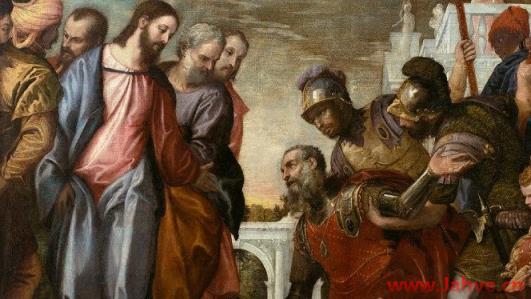 2018-7-1朋友们,今天福音的核心部分在耶稣治愈患血漏女人的故事。她在十二年内不停流血,也就是说任何人碰到她都会被视为不洁。在那样的一个社会里,她根本无法过上正常生活。她触摸了耶稣,这一举动是如此激进和危险,因为这样本来会使耶稣也变得不洁,但她的信德是如此强大,这一碰触反而使她变得洁净。耶稣效果显著地使她的社会身份完全恢复正常。此事最重要的后果是:耶稣含蓄地废除了《肋未纪》的礼仪法规。祂暗示全新的以色列民族,也就是天主教会,不再通过礼仪行为团结起来,而是通过效仿耶稣基督。请注意,这是《圣经新约》的重点。我们在其他福音篇章中读到耶稣说所有食物都是洁净的,而保禄的书信中总有反对《律法书》的言论。这些都表明了耶稣是新团体的中心。Friends, the centerpiece of today’s Gospel is Jesus healing the hemorrhaging woman. Having a flow of blood for twelve years meant that anyone with whom she came in contact would be considered unclean. She couldn’t, in any meaningful sense, participate in the ordinary life of her society.The woman touches Jesus—and how radical and dangerous an act this was, since it should have rendered him unclean. But so great is her faith that her touch, instead, renders her clean. Jesus effectively restores her to full participation in her community.But what is perhaps most important is this: Jesus implicitly puts an end to the ritual code of the book of Leviticus. What he implies is that the identity of the new Israel, the Church, would not be through ritual behaviors but through imitation of him. Notice please how central this is in the New Testament. We hear elsewhere in the Gospels that Jesus declares all foods clean, and throughout the letters of Paul we hear a steady polemic against the Law. All of this is meant to show that Jesus is at the center of the new community.
2018-7-1朋友们,今天福音的核心部分在耶稣治愈患血漏女人的故事。她在十二年内不停流血,也就是说任何人碰到她都会被视为不洁。在那样的一个社会里,她根本无法过上正常生活。她触摸了耶稣,这一举动是如此激进和危险,因为这样本来会使耶稣也变得不洁,但她的信德是如此强大,这一碰触反而使她变得洁净。耶稣效果显著地使她的社会身份完全恢复正常。此事最重要的后果是:耶稣含蓄地废除了《肋未纪》的礼仪法规。祂暗示全新的以色列民族,也就是天主教会,不再通过礼仪行为团结起来,而是通过效仿耶稣基督。请注意,这是《圣经新约》的重点。我们在其他福音篇章中读到耶稣说所有食物都是洁净的,而保禄的书信中总有反对《律法书》的言论。这些都表明了耶稣是新团体的中心。Friends, the centerpiece of today’s Gospel is Jesus healing the hemorrhaging woman. Having a flow of blood for twelve years meant that anyone with whom she came in contact would be considered unclean. She couldn’t, in any meaningful sense, participate in the ordinary life of her society.The woman touches Jesus—and how radical and dangerous an act this was, since it should have rendered him unclean. But so great is her faith that her touch, instead, renders her clean. Jesus effectively restores her to full participation in her community.But what is perhaps most important is this: Jesus implicitly puts an end to the ritual code of the book of Leviticus. What he implies is that the identity of the new Israel, the Church, would not be through ritual behaviors but through imitation of him. Notice please how central this is in the New Testament. We hear elsewhere in the Gospels that Jesus declares all foods clean, and throughout the letters of Paul we hear a steady polemic against the Law. All of this is meant to show that Jesus is at the center of the new community. 2018-7-2朋友们,在今天的福音中,一个似乎愿意追随耶稣的人提出一个合理的要求:“主,请许我先去埋葬我的父亲。”但令人惊讶的是,耶稣斥责他:“你跟随我吧!任凭死人去埋葬他们的死人!”有什么比追随耶稣更重要?没有。甚至我们社会中最神圣最受尊崇的惯例之一:孝敬仙逝的亲人。你能想象自己禁止某人出席其父母的葬礼吗?我不想软化、辩解或以当时背景来解释耶稣的这些话。这些话无论在当时还是当今都是这么苛刻。但这些话驱使我们作出选择:我们重视天主还是其他东西?宗教及其使命对我们来说是重要的还是仅具装饰意义?注意的是,我们通常不需要作出这种糟糕的选择。一般来说,我们对天主的爱与对家人的爱不会有冲突。但这是一种精神修炼、一种试验。如果我必须在天主和家人之间作出选择,我会如何抉择?Friends, in today’s Gospel, a man who appears willing to become Jesus’ disciple makes a reasonable request: "Lord, let me go first and bury my father." But the man receives a shocking rebuke from Jesus: "Follow me, and let the dead bury their dead."What is more important than the mission? Nothing. Not even one of the most sacred and revered practices of our society: piety toward our dead relatives. Could you imagine a scenario in which you wouldn’t give permission to someone to attend his father’s or mother’s funeral?I don’t want to soften Jesus’ words or explain them away or contextualize them. They are what they are, and they’re harsh, for the man in his own time and for us. But they compel us to make a decision: Are we finally about the things of God or about something else? Is religion and the mission attached to it substantial for us, or merely decorative? Now mind you, we don’t usually have to make such a terrible choice. Normally, our love for God and our love for family don’t come into conflict. But this is a sort of spiritual exercise, an experiment. What if it came down to God or my family? Whom would I choose?
2018-7-2朋友们,在今天的福音中,一个似乎愿意追随耶稣的人提出一个合理的要求:“主,请许我先去埋葬我的父亲。”但令人惊讶的是,耶稣斥责他:“你跟随我吧!任凭死人去埋葬他们的死人!”有什么比追随耶稣更重要?没有。甚至我们社会中最神圣最受尊崇的惯例之一:孝敬仙逝的亲人。你能想象自己禁止某人出席其父母的葬礼吗?我不想软化、辩解或以当时背景来解释耶稣的这些话。这些话无论在当时还是当今都是这么苛刻。但这些话驱使我们作出选择:我们重视天主还是其他东西?宗教及其使命对我们来说是重要的还是仅具装饰意义?注意的是,我们通常不需要作出这种糟糕的选择。一般来说,我们对天主的爱与对家人的爱不会有冲突。但这是一种精神修炼、一种试验。如果我必须在天主和家人之间作出选择,我会如何抉择?Friends, in today’s Gospel, a man who appears willing to become Jesus’ disciple makes a reasonable request: "Lord, let me go first and bury my father." But the man receives a shocking rebuke from Jesus: "Follow me, and let the dead bury their dead."What is more important than the mission? Nothing. Not even one of the most sacred and revered practices of our society: piety toward our dead relatives. Could you imagine a scenario in which you wouldn’t give permission to someone to attend his father’s or mother’s funeral?I don’t want to soften Jesus’ words or explain them away or contextualize them. They are what they are, and they’re harsh, for the man in his own time and for us. But they compel us to make a decision: Are we finally about the things of God or about something else? Is religion and the mission attached to it substantial for us, or merely decorative? Now mind you, we don’t usually have to make such a terrible choice. Normally, our love for God and our love for family don’t come into conflict. But this is a sort of spiritual exercise, an experiment. What if it came down to God or my family? Whom would I choose?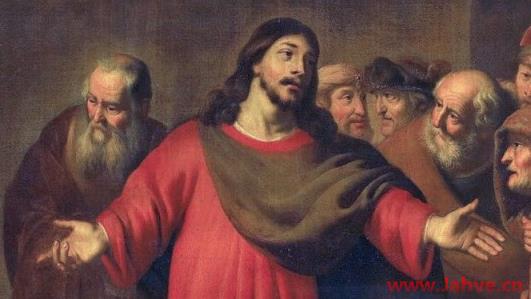 2018-7-3朋友们,今天的福音纪念的是宗徒圣多默。我们为什么如此喜欢多疑多默的故事?也许因为这位圣人特别适合我们这一代人。现代作风从一开始就有两大标志:怀疑论和经验论。这两大标志在多默身上都显而易见:“我除非看见他手上的钉孔,用我的指头,探入钉孔;用我的手,探入他的肋旁,我决不信。”我认为怀疑论和“眼见为实”的经验论在很多情况下都是必须的。我们不应该轻信他人、易受欺骗或幼稚天真。有时从零开始、扫除陈腐、拆穿学术谎言的确是好事,尤其在宗教领域里面。确实,天主教有着非常深厚的学术传统,教徒在此传统中不断发问、思考、求解。然而,当死而复生的耶稣再次出现,这次趁着多默在场,他邀请这个多疑的人来看、来留意、来触摸。然后他说出那句令人羞愧难当的话:“因为你看见了我,才相信吗?那些没有看见而相信的,才是有福的!”Friends, today’s Gospel celebrates St. Thomas the Apostle. Why do we love this story of doubting Thomas so much? Perhaps because he is a saint especially suitable for our time. Modernity has been marked, from its beginning, by two great qualities: skepticism and empiricism, the very qualities we can discern in Thomas: "Unless I see the mark of the nails in his hands and put my finger into the nail marks and put my hand into his side, I will not believe."And I think a good amount of skepticism and "show-me" empiricism is called for in many situations and contexts. We shouldn’t be credulous, gullible, or naïve. Sometimes it is indeed good to wipe the slate clean, to clear out old cobwebs and intellectual humbugs, perhaps especially in the area of religion. Indeed, Catholicism has a very rich intellectual tradition, a tradition of questioning, wondering, and seeking understanding.Yet when the risen Jesus reappears, this time in the presence of Thomas, he invites the doubter to look, to see, and to touch. Then that devastating line: "Have you come to believe because you have seen me? Blessed are those who have not seen and have believed."
2018-7-3朋友们,今天的福音纪念的是宗徒圣多默。我们为什么如此喜欢多疑多默的故事?也许因为这位圣人特别适合我们这一代人。现代作风从一开始就有两大标志:怀疑论和经验论。这两大标志在多默身上都显而易见:“我除非看见他手上的钉孔,用我的指头,探入钉孔;用我的手,探入他的肋旁,我决不信。”我认为怀疑论和“眼见为实”的经验论在很多情况下都是必须的。我们不应该轻信他人、易受欺骗或幼稚天真。有时从零开始、扫除陈腐、拆穿学术谎言的确是好事,尤其在宗教领域里面。确实,天主教有着非常深厚的学术传统,教徒在此传统中不断发问、思考、求解。然而,当死而复生的耶稣再次出现,这次趁着多默在场,他邀请这个多疑的人来看、来留意、来触摸。然后他说出那句令人羞愧难当的话:“因为你看见了我,才相信吗?那些没有看见而相信的,才是有福的!”Friends, today’s Gospel celebrates St. Thomas the Apostle. Why do we love this story of doubting Thomas so much? Perhaps because he is a saint especially suitable for our time. Modernity has been marked, from its beginning, by two great qualities: skepticism and empiricism, the very qualities we can discern in Thomas: "Unless I see the mark of the nails in his hands and put my finger into the nail marks and put my hand into his side, I will not believe."And I think a good amount of skepticism and "show-me" empiricism is called for in many situations and contexts. We shouldn’t be credulous, gullible, or naïve. Sometimes it is indeed good to wipe the slate clean, to clear out old cobwebs and intellectual humbugs, perhaps especially in the area of religion. Indeed, Catholicism has a very rich intellectual tradition, a tradition of questioning, wondering, and seeking understanding.Yet when the risen Jesus reappears, this time in the presence of Thomas, he invites the doubter to look, to see, and to touch. Then that devastating line: "Have you come to believe because you have seen me? Blessed are those who have not seen and have believed."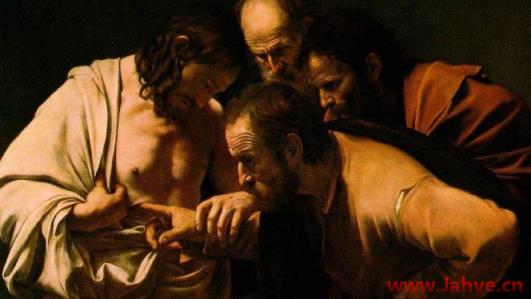 2018-7-4朋友们,在今天的福音中我们读到奇迹缔造者耶稣治愈了两个着魔的人。无可否认,第一批基督徒对耶稣所行的奇迹颇感兴趣,而且他们并不把这些奇迹只看作文学象征。英国圣公会神学家N. T. Wright提出:如果不考虑人们对耶稣所行奇迹的着迷程度,我们是很难解释他当时为什么如此广受欢迎的。虽然天主一般来说都会让宇宙按其自然规律和模式来运行发展,但是又有什么可以阻止天主偶尔以神奇的方式来塑造或影响宇宙,以此表明祂的目的和祂的存在呢?若你要证据,我想介绍一本非比寻常的书给你。书名很简单:《奇迹:<新约全书>所记述的可信性》,作者是新教学者克雷格·基纳。此书对奇迹的神学论和现象论真的进行了详尽的研究,作者详细复述了来自世界各地确确实实数以百万计的奇迹报道,有的甚至发生在当代,其中的一些奇迹是书中最出人意料、最激动人心的部分(至少对于我来说)。如果你怀疑天主在当今世上是否还会缔造奇迹的话,打开这本书读一下,然后再想想吧。Friends, in today’s Gospel we see Jesus, the miracle worker, healing two demoniacs. I think it’s hard to deny that the first Christians were intensely interested in the miracles of Jesus and that they didn’t see them as mere literary symbols. Anglican theologian N.T. Wright argues that it’s hard to explain the enormous popularity of Jesus apart from this fascination with his wonder-working.Though God typically lets the universe run according to its natural rhythms and patterns, what is to prevent God from shaping it or influencing it occasionally in remarkable ways in order to signal his purpose and his presence?For evidence of this, I would like to draw your attention to an extraordinary book. It bears the simple title Miracles: The Credibility of the New Testament Accounts, and it is written by the Protestant scholar Craig Keener. It is a truly exhaustive study of the theology and phenomenology of miracles, but the most surprising and exciting section of the book—at least for me—was his rehearsal of some of the literally millions of reports of miracles that come, even today, from every corner of the world. If you doubt God still works in the world today, pick up that book and think again.
2018-7-4朋友们,在今天的福音中我们读到奇迹缔造者耶稣治愈了两个着魔的人。无可否认,第一批基督徒对耶稣所行的奇迹颇感兴趣,而且他们并不把这些奇迹只看作文学象征。英国圣公会神学家N. T. Wright提出:如果不考虑人们对耶稣所行奇迹的着迷程度,我们是很难解释他当时为什么如此广受欢迎的。虽然天主一般来说都会让宇宙按其自然规律和模式来运行发展,但是又有什么可以阻止天主偶尔以神奇的方式来塑造或影响宇宙,以此表明祂的目的和祂的存在呢?若你要证据,我想介绍一本非比寻常的书给你。书名很简单:《奇迹:<新约全书>所记述的可信性》,作者是新教学者克雷格·基纳。此书对奇迹的神学论和现象论真的进行了详尽的研究,作者详细复述了来自世界各地确确实实数以百万计的奇迹报道,有的甚至发生在当代,其中的一些奇迹是书中最出人意料、最激动人心的部分(至少对于我来说)。如果你怀疑天主在当今世上是否还会缔造奇迹的话,打开这本书读一下,然后再想想吧。Friends, in today’s Gospel we see Jesus, the miracle worker, healing two demoniacs. I think it’s hard to deny that the first Christians were intensely interested in the miracles of Jesus and that they didn’t see them as mere literary symbols. Anglican theologian N.T. Wright argues that it’s hard to explain the enormous popularity of Jesus apart from this fascination with his wonder-working.Though God typically lets the universe run according to its natural rhythms and patterns, what is to prevent God from shaping it or influencing it occasionally in remarkable ways in order to signal his purpose and his presence?For evidence of this, I would like to draw your attention to an extraordinary book. It bears the simple title Miracles: The Credibility of the New Testament Accounts, and it is written by the Protestant scholar Craig Keener. It is a truly exhaustive study of the theology and phenomenology of miracles, but the most surprising and exciting section of the book—at least for me—was his rehearsal of some of the literally millions of reports of miracles that come, even today, from every corner of the world. If you doubt God still works in the world today, pick up that book and think again.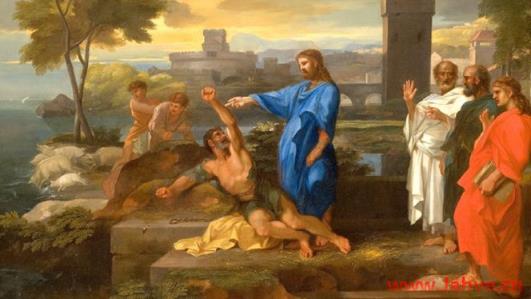 2018-7-5朋友们,在今天的福音中耶稣治愈了一个瘫子,但在治愈他的瘫痪前首先赦免了他的罪过:”有人给他送来一个躺在床上的瘫子,耶稣一见他们的信心,就对瘫子说:“孩子,你放心!你的罪赦了。” 经师们在心里认为他说了亵渎神明的话,而耶稣读懂了他们的心思,于是说,“什么比较容易呢?是说:’你的罪赦了,或是说:起来行走吧?’” 在经师们无言以对之际,耶稣让瘫子拿起床回家去了。这个故事证实了耶稣愿意宽恕我们、治愈我们。即使我们是罪人、即使我们无可救药地陷于仇恨和愚笨之中、即使我们曾经无法无天地杀害了天主的亲子(甚至今时今日还会重蹈覆辙),天主依然爱我;天主依然宽恕我们。我们知道没有什么东西能使我们与天主的爱相隔绝,因为从耶稣复活后给信徒们打的招呼中我们得知天主能宽恕任何罪过。
2018-7-5朋友们,在今天的福音中耶稣治愈了一个瘫子,但在治愈他的瘫痪前首先赦免了他的罪过:”有人给他送来一个躺在床上的瘫子,耶稣一见他们的信心,就对瘫子说:“孩子,你放心!你的罪赦了。” 经师们在心里认为他说了亵渎神明的话,而耶稣读懂了他们的心思,于是说,“什么比较容易呢?是说:’你的罪赦了,或是说:起来行走吧?’” 在经师们无言以对之际,耶稣让瘫子拿起床回家去了。这个故事证实了耶稣愿意宽恕我们、治愈我们。即使我们是罪人、即使我们无可救药地陷于仇恨和愚笨之中、即使我们曾经无法无天地杀害了天主的亲子(甚至今时今日还会重蹈覆辙),天主依然爱我;天主依然宽恕我们。我们知道没有什么东西能使我们与天主的爱相隔绝,因为从耶稣复活后给信徒们打的招呼中我们得知天主能宽恕任何罪过。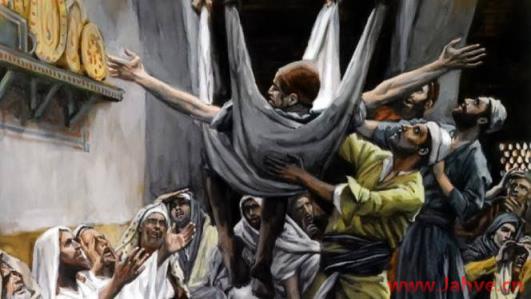 Friends, in our Gospel today Jesus heals a paralytic, but not before first forgiving his sins: "People brought to him a paralytic lying on a stretcher. When Jesus saw their faith, he said to the paralytic, ‘Courage, child, your sins are forgiven.’" Jesus read the hearts of scribes who had decided he was blaspheming, and so he replied, "Which is easier, to say, ‘Your sins are forgiven,’ or to say, ‘Rise and walk?’" When no reply came, Jesus sent the man off home carrying his stretcher.The story affirms that Jesus offers us forgiveness and healing. Even though we are sinners, even though we are hopeless in our hatred and stupidity, even though we had gone (and would still go today) to the limits of killing God’s own son, God still loves us; God still forgives us. We know that nothing can possibly separate us from the love of God because we hear in the greeting of the risen Jesus that any and every sin can be forgiven.
Friends, in our Gospel today Jesus heals a paralytic, but not before first forgiving his sins: "People brought to him a paralytic lying on a stretcher. When Jesus saw their faith, he said to the paralytic, ‘Courage, child, your sins are forgiven.’" Jesus read the hearts of scribes who had decided he was blaspheming, and so he replied, "Which is easier, to say, ‘Your sins are forgiven,’ or to say, ‘Rise and walk?’" When no reply came, Jesus sent the man off home carrying his stretcher.The story affirms that Jesus offers us forgiveness and healing. Even though we are sinners, even though we are hopeless in our hatred and stupidity, even though we had gone (and would still go today) to the limits of killing God’s own son, God still loves us; God still forgives us. We know that nothing can possibly separate us from the love of God because we hear in the greeting of the risen Jesus that any and every sin can be forgiven.

微信小程序
微信扫一扫体验

微信公众账号
微信扫一扫加关注
顶部
